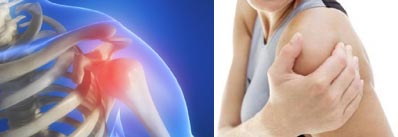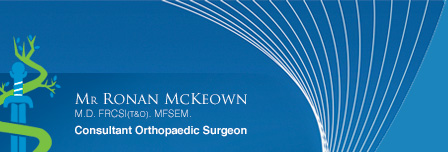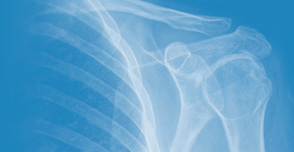|
Frozen Shoulder / Adhesive
Capsulitis

Frozen Shoulder (Adhesive Capsulitis) is a
common cause of pain and stiffness.
This condition leads to a global reduction in
the range of motion of the your shoulder
(stiffness). It may occur for no apparent reason
or may follow an injury or surgery to your
shoulder. It is more common in women and
diabetics (when it is often bilateral and
resistant to treatment).
There are three recognized stages of
development. The duration of each stage is
variable and they overlap to some degree.
Stages:
Freezing
Frozen
Thawing
1.
Freezing
Often, the first sign of “frozen shoulder” is
pain. This can be severe and can waken you at
night. The pain is "within the shoulder". The
shoulder is painful to move, particularly into
internal rotation (reaching behind the back) and
external rotation (turning the hand away from
the body. This stage may last 2 – 10 months.
2. Frozen
As the condition progresses the pain in your
shoulder subsides but the stiffness may
increase. The stiffness may be so severe that
your shoulder has almost no movement. This stage
can last a further 12 months
3. Thawing
The stiffness may then improve over an 18 month
to 2 year period following onset of symptoms.
Sometimes you may be left with a residual loss
of motion. If no treatment is given, most
shoulders will gradually improve over 2 – 4
years. However treatment is available to shorten
the duration of the disease process.
If pain is the most pressing
problem, then treatment can comprise of
(i) Peri-articular steroid
injection
(ii) Hydrodilataion of Shoulder
(iii) Physiotherapy
If stiffness is the most major problem, then
I perform Arthroscopic Capsular Release.
Arthroscopic
Capsular Release
This procedure entails precise tailored excision
/ division of contractures of the shoulder
capsule to allow increased range of movement. It
is recommended that you stop aspirin or similar
medications 7 days prior to surgery, if it is
safe to do so.
The
Procedure
The operation is arthroscopic (keyhole) and is
performed under general anaesthetic. My
anaesthetist will often perform a brachial
plexus nerve blockade or insert an indwelling
brachial plexus catheter at the same time. This
allows intensive, painfree in-patient
physiotherapy for 24 – 48 hours post surgery in
order to maximize surgical outcome.
You will have 2 small (5mm) length incisions,
one behind and one in front of the shoulder
joint. The interior of the shoulder joint is
visualized with a keyhole camera system through
the posterior portal (incision). The anterior
incision is used to pass a radiofrequency probe
and other instruments to surgically resect the
contracted capsule.
Post-operative
Care
When you have come around from your anaesthetic
I will be able to demonstrate to you the range
of motion achieved.
Following your surgery:
- you will have an absorbent dressing covering
you shoulder for 24 hours to absorb the
arthroscopic fluid that was pumped through your
shoulder during the procedure.
- you will have an icepack to help reduce post
op inflammation. I recommend it is applied for
30-45 minutes and then removed for 2 hours
before being re-applied. This has been shown to
be effective for up to 72 hours post surgery.
- Sutures are not routinely inserted. Surgical
dressings over the wounds should not be removed
for 2 weeks.
- a physiotherapist will begin your
rehabilitation and mobilize your shoulder as
frequently as possible
- You will normally stay in hospital one to two
days post surgery for maximum supervised
physiotherapy and can be discharged whenever the
nerve block has worn off.
- When you get home it is important to continue
to exercise your shoulder as often as possible.
You may need to take regular analgesia to reduce
your pain and allow rehabilitative exercise.
Capsular
Release
Outcome
There is some medical evidence available that
shows that over the next 6 months, the gains
achieved by surgery can sometimes diminish by up
50% but then improve again.
Complications
Complications of arthroscopic capsular release
are rare but can include increased pain,
infection, nerve damage and fracture.
|







